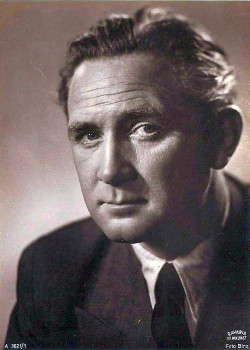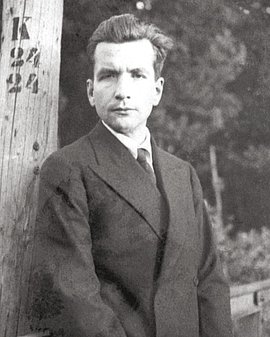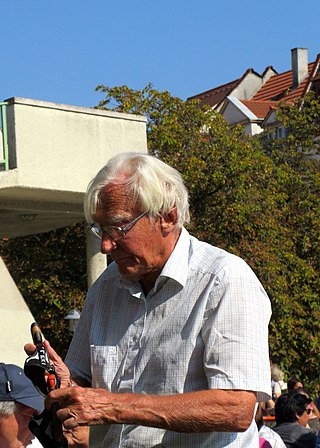Related Research Articles
Patrick Süskind is a German writer and screenwriter, known best for his novel Perfume: The Story of a Murderer, first published in 1985.
The term degree is used in several scales of temperature, with the notable exception of kelvin, primary unit of temperature for engineering and the physical sciences. The degree symbol ° is usually used, followed by the initial letter of the unit; for example, "°C" for degree Celsius. A degree can be defined as a set change in temperature measured against a given scale; for example, one degree Celsius is one-hundredth of the temperature change between the point at which water starts to change state from solid to liquid state and the point at which it starts to change from its liquid to gaseous state.

Leonhard Ragaz was a Swiss Reformed theologian and, with Hermann Kutter, one of the founders of religious socialism in Switzerland. He was influenced by Christoph Blumhardt. He was married to the feminist and peace activist Clara Ragaz-Nadig.
Helmut Schoeck was an Austrian-German sociologist and writer best known for his work Envy: A Theory of Social Behavior.

Gustav Knuth was a German film actor. He appeared in more than 120 films between 1935 and 1982 and starred in the TV series Alle meine Tiere. He was married to the actress Elisabeth Lennartz.

Walter Schmiele was a German writer and translator.

The works of the German sociologist and philosopher Jürgen Habermas include books, papers, contributions to journals, periodicals, newspapers, lectures given at conferences and seminars, reviews of works by other authors, and dialogues and speeches given in various occasions. Working in the tradition of critical theory and pragmatism. Habermas is perhaps best known for his theory on the concepts of 'communicative rationality' and the 'public sphere'. His work focuses on the foundations of social theory and epistemology, the analysis of advanced capitalistic societies and democracy, the rule of law in a critical social-evolutionary context, and contemporary politics—particularly German politics. Habermas's theoretical system is devoted to revealing the possibility of reason, emancipation, and rational-critical communication latent in modern institutions and in the human capacity to deliberate and pursue rational interests.
Skot is an old and deprecated measurement unit of luminance, used for self-luminous objects. The term comes from Greek skotos, meaning "darkness".

Karl Krolow was a German poet and translator. In 1956 he was awarded the Georg Büchner Prize. He was born in Hanover, Germany, and died in Darmstadt, Germany.

Hermann Merxmüller was a German botanist and taxonomist.

Elisabeth Kulmann was a Russian-born poet and translator who worked in Russian, German and Italian.

Gerhard Zwerenz was a German writer and politician. From 1994 until 1998 he was a member of the Bundestag for the Party of Democratic Socialism (PDS).

Werner Krauss was a German university professor.
Gerhard Storz was the son of a Lutheran pastor from Württemberg who at various stages distinguished himself in theatre productions, as a scholar, an educationalist, a politician and an author-journalist, sometimes pursuing one career at a time and sometimes several in combination. Throughout his adult life he liked to see himself as a "language therapist". "Human speech seems to have been encoded, sealed into formulaic structures, and pressed into service for mechanistic operations", he once wrote.

Helm Stierlin, born as Wilhelm Paul Stierlin, was a German psychiatrist, psychoanalyst and systemic family therapist. From 1974 to 1991 he was the medical director and chairowner of the Department for psychoanalytic basic research and Family Therapy at the Medical Faculty of the University of Heidelberg. Stierlin contributed significantly to the establishment and further development of systemic therapy in Germany.
Kurt Karl Eberlein was a German art historian who was close to the Nazi ideology.

The Wasserschloss Steinen is a fortified house in the northern part of the village Steinen in the district Lörrach.

The Freies Deutsches Hochstift is a literary association based in Frankfurt, Hesse, Germany. It is the owner of the Goethe House, the place where the playwright and poet Johann Wolfgang von Goethe was born and spent his early years, which it operates as a museum. The Hochstift also manages the Deutsches Romantik-Museum, a museum dedicated to German Romanticism which opened in 2021.
Ernst Beutler was a German literary historian and Goethe researcher who served as the director of the Freies Deutsches Hochstift literary society between 1925 and 1960.
References
- ↑ Monika Waldmüller: "Die Wandlung. Eine Monatsschrift." Herausgegeben von Dolf Sternberger unter Mitwirkung von Karl Jaspers, Werner Krauss und Alfred Weber. Deutsche Schillergesellschaft, Marbach 1988
- ↑ Patricia Oster. "Die Zeitschrift als Ort der Konstitution eines ‚transnationalen' kulturellen Feldes: Lancelot – Der Bote aus Frankreich und Die Wandlung (Abstract)". Universität des Saarlandes. Retrieved 4 April 2016.
- ↑ "Über Dolf Sternberger". Dolf Sternberger-Gesellschaft e.V., Heidelberg. Retrieved 4 April 2016.
- ↑ Die Wandlung: Geleitwort (lead article): Volume 1, Nov 1945, pages 1-6
- ↑ Rudolf Walter Leonliardt (24 October 1957). "Der Unmensch ist unter uns: Ein Wörterbuch, bei dem die Seitenzahl der wichtigste Anlaß zu einer Kritik ist". Die Zeit (online). Retrieved 4 April 2016.
- ↑ "Sprache / Wörterbuch - Betreutes Deutsch". Der Spiegel. 1957. Retrieved 4 April 2016.